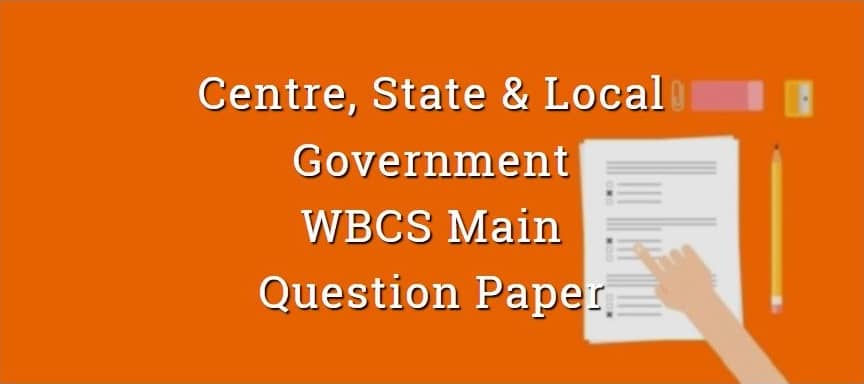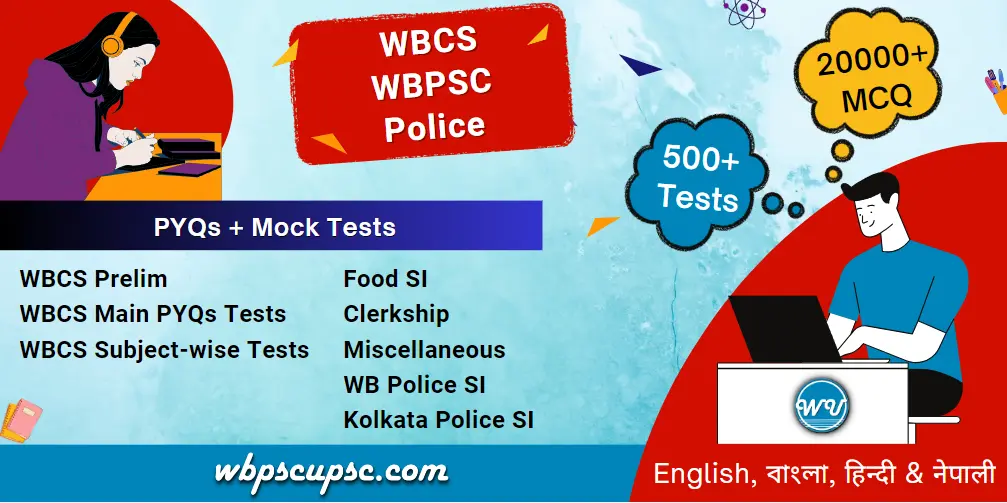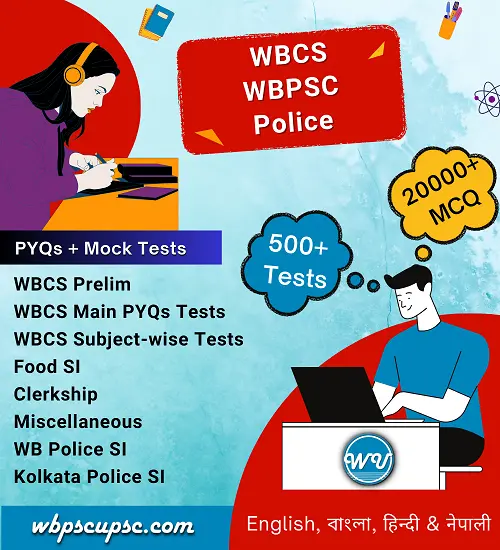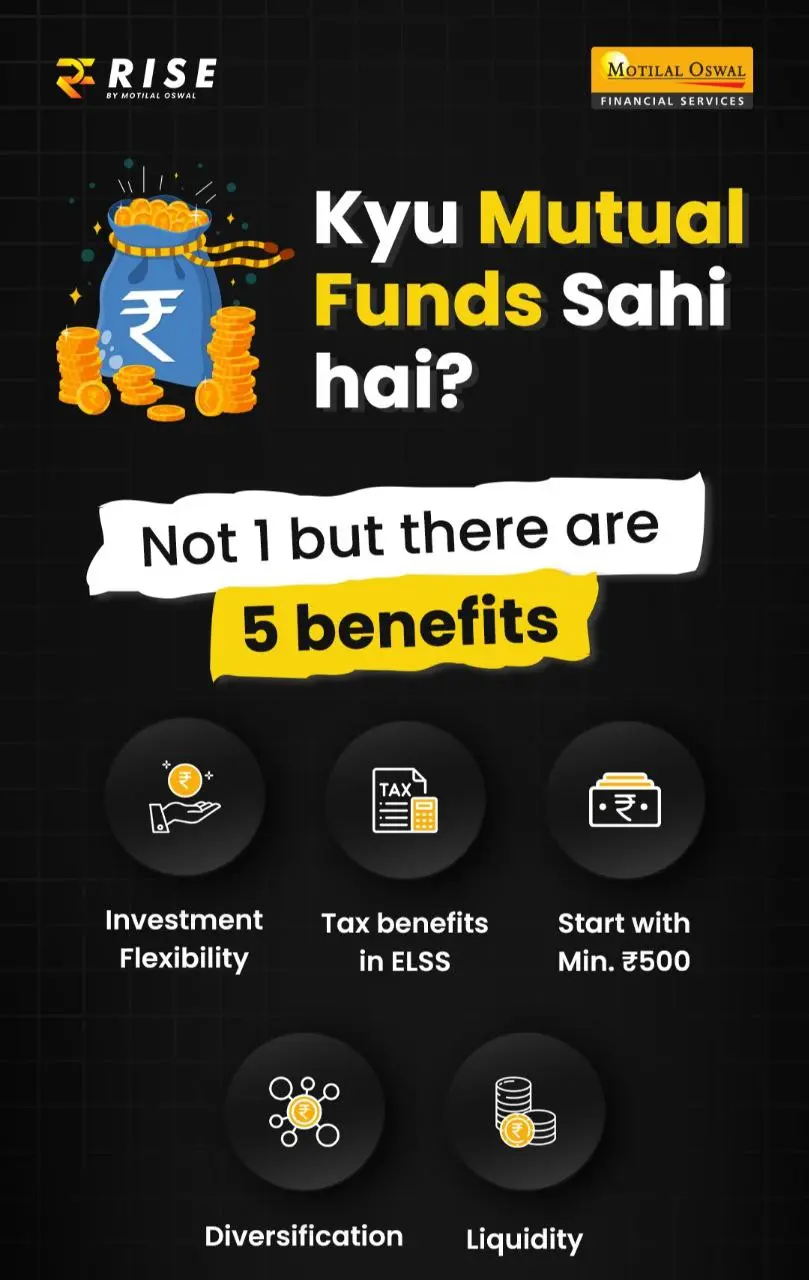Centre, State & Local Government – Indian Polity – WBCS Main Question Paper
Contents

parliament question for psc exam
WBCS Main Question Paper – 2022
- Power of the President to consult Supreme Court has been stated under
(A) Article 144
(B) Article 142
(C) Article 143
(D) Article 141
- Who can legislate on those residual matters which are not mentioned in union/state/concurrent list?
(A) State Legislature exclusively
(B) Parliament alone
(C) Parliament after consultation with state legislatures
(D) Parliament or state legislature as adjudicated by the Supreme Court of India
- The President can issue proclamation of emergency
(A) on the advice of the Prime Minister
(B) on the advice of Council of Ministers
(C) on the request of the Vice-President
(D) when the decision of the Union Cabinet for the issuance of such proclamation is communicated to the President in writing
(A) Only in the Lok Sabha
(B) Only in the Rajya Sabha
(C) In both the Houses simultaneously
(D) At the joint session of both the Houses
- Which one of the following items/subjects belongs to the Concurrent List of the VIIth schedule of the Indian Constitution?
(A) Public Health and Sanitation
(B) Forests
(C) Stock Exchanges
(D) Agriculture
- How soon imposition of National Emergency should be approved by the Parliament?
(A) 1 month
(B) 2 months
(C) 3 months
(D) 6 months
- “Power of Parliament to amend the Constitution and procedure therefore” is laid down in the
Constitution in—
(A) Part XX
(B) Part XXI
(C) Part XXII
(D) Part XXIII
- Disqualification of membership of either House of the Parliament is provided under
(A) Article 100
(B) Article 101
(C) Article 102
(D) Article 103
(A) President
(B) Speaker
(C) Vice-president
(D) Chief Justice of Supreme Court
(A) President, House of the People and Council of States
(B) House of the People and Council of States
(C) Vice-President, House of the People and Council of States
(D) President, Vice-President, House of the People and Council of States
- The maximum age prescribed for election of President in India is
(A) 35 years
(B) 60 years
(C) 65 years
(D) No such limit
(A) 18
(B) 12
(C) 20
(D) 16
- Which Indian State has the largest number of seats reserved for the Scheduled Tribes in the Lok Sabha?
(A) Madhya Pradesh
(B) Rajasthan
(C) Andhra Pradesh
(D) Arunachal Pradesh
- Minimum age required to become a member of Council of States is
(A) 18 years
(B) 25 years
(C) 30 years
(D) 35 years
- Joint sitting of the Lok Sabha and Rajya Sabha is provided in the Constitution of India under
(A) Article 101
(B) Article 108
(C) Article 133
(D) Article 102
(A) Only once
(B) Twice
(C) Thrice
(D) Never
- The members of the Council of Ministers are collectively responsible to
(A) Judiciary
(B) House of the People
(C) Council of States
(D) The President
- Which of the following is a part of the electoral college for the Election of the President but does not participate in the proceedings for his/her impeachment?
(A) Lok Sabha
(B) Rajya Sabha
(C) State Legislative Assemblies
(D) State Legislative Councils
- Which of the following Indian States does not have a Bicameral Legislature?
(A) Uttar Pradesh
(B) Bihar
(C) Chhattisgarh
(D) Jammu and Kashmir
- The number of the Anglo Indians nominated to the House of People is
(A) 1
(B) 2
(C) 3
(D) 4
- Who has the right to decide that who will be included in the list of Scheduled Castes and Scheduled Tribes?
(A) Parliament
(B) President
(C) Governor of the State
(D) Supreme Court
- Which of the following Article deals with the election of the Vice-President?
(A) 62
(B) 64
(C) 66
(D) 68
(A) 250
(B) 238
(C) 245
(D) 230
- The resolution to remove the Vice-President of India can be moved by
(A) Lok Sabha
(B) Rajya Sabha
(C) Any State Legislature
(D) Either House of the Parliament
- With reference to election of the President under Article 55 of the Constitution of India, every elected member of the legislative assembly shall have as many votes as there are multiples of one thousand in the quotient obtained by dividing the population of the State by
(A) Total number of the elected members of the assembly
(B) Total number of nominated members of the Rajya Sabha
(C) Total number of the elected members of both the Houses
(D) None of the above
(A) 542
(B) 545
(C) 552
(D) 567
- Under which Article of the Constitution of India Financial Emergency can be proclaimed?
(A) Article 323
(B) Article 356
(C) Article 352
(D) Article 360
- If the announcement of National Emergency has been approved by both Houses of parliament, how long will it be effective?
(A) 1 month
(B) 2 months
(C) 3 months
(D) 6 months
- A proposal to prefer the charge of impeachment of the President of India has to be moved after prior notice of
(A) 7 days
(B) 14 days
(C) 21 days
(D) 30 days
- Which Part of the Constitution of India deals with “Emergency Provisions”?
(A) Part IX
(B) Part XVIII
(C) Part XXII
(D) Part XVI
- Which of the following Constitutional Amendments equipped President to impose National
Emergency on any particular part of India?
(A) 38th Amendment
(B) 40th Amendment
(C) 42nd Amendment
(D) 62nd Amendment
195. The system of Panchayati Raj involves
(A) Village, State and Union levels
(B) Village, District and State levels
(C) Village and State levels
(D) Village, Block and District levels
WBCS Main Question Paper – 2021
- India is a Republic in the sense that
(A) it has an elected Head of the state
(B) parliamentary form of government
(C) it has an elected government
(D) it has a Prime Minister
- Fill in the blank.
Article _______ pertains to the amendment of the Constitution of India.
(A) 365
(B) 372
(C) 368
(D) 268
- Who was the First Deputy Prime Minister of India?
(A) V. R. Gill
(B) R. N. Shukla
(C) Chaudhary Devi Lal
(D) Sardar Vallabhbhai Patel
- The Tenth Schedule to the Constitution is related to
(A) provisions for administration of Tribal Areas in Assam, Meghalaya, Tripura and Mizoram.
(B) provisions regarding disqualification on ground of defection.
(C) provisions in relation to the allocation of seats for States and Union Territories in the Rajya Sabha.
(D) provisions as to the Administration and Control of Scheduled Areas and Scheduled Tribes.
- Which Commission has examined the Centre-State relations?
(A) Sarkaria Commission
(B) Sri Krishna Commission
(C) Rajamannar Commission
(D) Kher Commission
- Under which Article of the Constitution is the President’s Rule promulgated in any state in India?
(A) Article 326
(B) Article 370
(C) Article 380
(D) Article 356
- Financial Emergency is contained in Article
(A) 352
(B) 360
(C) 356
(D) All of the above
- Public Accounts Committee has Members from
(A) House of the People
(B) Council of States only
(C) State Legislatures
(D) Both Houses of Parliament
- Which of the Lists are in the Constitution of India?
(A) State List
(B) Union List
(C) Concurrent List
(D) All of the above
- Which Committee made recommendations for local Self Government?
(A) Kothari Commission
(B) Sarkaria Commission
(C) Balwant Rai Mehta Committee
(D) Venkatachaliah Commission
- Prorogation of the House means Mode
(A) The House has been brought into Session
(B) The House itself stands terminated
(C) The Session of the House has been terminated
(D) None of the above
- What is the minimum age for appointment as a Governor?
(Article 153-162)
(A) 30 years
(B) 40 years
(C) 35 years
(D) 45 years
- Which Article relates to the Panchayati Raj in India?
(A) Article 243
(B) Article 245
(C) Article 242
(D) Article 244
- Chief Minister of a State is responsible to ______.
(A) Prime Minister
(B) Rajya Sabha
(C) Legislative Assembly
(D) Governor
- Which Schedule contains the Union List?
(A) Fourth Schedule
(B) Fifth Schedule
(C) Seventh Schedule
(D) None of the above
- Who is the Legal Advisor of the Government of a State in India?
(Article 165)
(A) The Advocate General
(B) Chief Justice of India
(C) Judges of Supreme Court
(D) Vice-President
- The Speaker of Lok Sabha is
(A) elected by Members of Parliament.
(B) Prime Minister.
(C) elected by majority party in the Lok Sabha.
(D) None of the above
- Which Article was given effect to by the 73rd Amendment?
(A) Article 47
(B) Article 40
(C) Article 45
(D) Article 46
- The Council of Ministers in a Parliamentary type of Government can remain in office till it enjoys the support of the ________.
(Article 74)
(A) Minority of Members of the Upper House of Parliament
(B) Majority of the Members of the Upper House of Parliament
(C) Minority of the Members of the Lower House
(D) Majority of the Members of the Lower House of Parliament
- Which Schedule of the Indian Constitution prescribes the distribution of seats in Rajya Sabha?
(A) 10th Schedule
(B) 4th Schedule
(C) 8th Schedule
(D) 2nd Schedule
- Who can initiate impeachment proceedings against the President of India?
(A) Either House of Parliament
(B) Any Vidhan Sabha
(C) Only Lok Sabha
(D) Only Rajya Sabha
- Service tax is not levied in which of the states?
(A) Nagaland
(B) Arunachal Pradesh
(C) Mizoram
(D) Jammu and Kashmir
(wrong question)
- The power of ‘amnesty’ in India is given to the
(an official pardon for people)
(A) President
(B) Prime Minister
(C) Chief Minister
(D) Parliament
- Who administers Oath to the Governor of a State?
(Article 159)
(A) President
(B) Chief Justice of India
(C) Chief Justice of High Court
(D) Vice-President
- Who does not constitute the electoral college for electing the President of India?
(A) Elected Members of Lok Sabha
(B) Elected Members of Legislative Assembly of each State
(C) Elected Members of Legislative Council
(D) Elected Members of Rajya Sabha
- The Union Council of Ministers are collectively responsible to
[Article 75(3)]
(A) Judiciary
(B) House of the People
(C) Council of States
(D) The President
- The Members of the Council of States in India are elected for a period of
(A) 4 years
(B) 5 years
(C) 6 years
(D) Lifetime
- Money Bill is given under which Article of the Constitution of India?
(A) Article 110
(B) Article 210
(C) Article 101
(D) Article 201
- Who acts as the President of India in the absence of both the President and Vice-President?
(A) Speaker of Lok Sabha
(B) Comptroller and Auditor General
(C) Cabinet Secretary
(D) Chief Justice of India
- The maximum strength of Rajya Sabha is
(A) 220
(B) 250
(C) 230
(D) 240
- Which of the following appointments is not made by the President of India?
(A) Chief of the Army
(B) Speaker of the Lok Sabha
(C) Chief Justice of India
(D) Chief of the Air force
- Article 352 of the Indian Constitution relates to
(A) Centre-State relations
(B) Supreme Court jurisdiction
(C) State Emergency
(D) National Emergency
- The President of India has almost the same Constitutional authority as the
(A) President of USA
(B) British Monarch
(C) President of Russia
(D) President of China
- What is the term of a Vice-President of India?
(A) 4 years
(B) 5 years
(C) 65 years
(D) 6 years
- Who promulgates ordinance in the States of India?
(Article 213)
(A) Governor
(B) Chief Minister
(C) President
(D) Chief Justice
- When can a President use his discretion in appointing the Prime Minister?
(A) When no political party enjoys a clear majority in Lok Sabha
(B) Only when the Lok Sabha has been dissolved
(C) Under all circumstances the President faces
(D) Under no circumstances
- The President can proclaim emergency on the written advice of the
(A) Speaker of Lok Sabha
(B) Prime Minister
(C) Chief Justice of India
(D) Union Cabinet
- Rajya Sabha can delay the Money Bill for
(A) Indefinite period
(B) 6 months
(C) 30 days
(D) 14 days
- Article 80 deals with
(A) composition of Lok Sabha
(B) composition of Rajya Sabha
(C) composition of State Legislative Assembly
(D) composition of State Legislative Council
- Who is the Chairman of the Rajya Sabha?
(A) President
(B) Vice-President
(C) Prime Minister
(D) None of the above
- What is the Council of States known in India?
(A) Lok Sabha
(B) Parliament
(C) Rajya Sabha
(D) Vidhan Sabha
(A) revised estimates for the current year.
(B) budget estimates for the following year.
(C) actual figures of the preceding year.
(D) All of the above
- Our financial system has provided for the transfer of resources from the centre to the states; the important means of resource transfer are
(A) tax sharing
(B) grant-in aids
(C) loans
(D) All of the above
- Who appoints the Governor of a State?
(A) Prime Minister
(B) The President of India
(C) Vice-President
(D) Chief Minister
WBCS Main Question Paper – 2020
- Who is a Pro-tem Speaker in the Lok Sabha ?
(A) The first meeting after the general election in which the Speaker is elected by the members of Lok Sabha, is held under the senior most member of Parliament is commonly known as Pro-tem Speaker.
(B) A temporary Speaker elected by the House when the Speaker has taken a leave of absence.
(C) The Speaker elected by the House when both the Speaker and the Deputy Speaker are absent.
(D) The Speaker who presides over a joint session of Parliament.
- Fill in the blank :
The office of the President of India can fall vacant ______ .
(A) in case of death of a President
(B) if a President resigns from his post
(C) on the commencement of impeachment in the Lok Sabha
(D) Only (A) and (B)
- Who is the highest law officer in the States of India under Article 165 ?
(A) Secretary General of the State
(B) Advocate General
(C) Chief Justice of the State High Court
(D) The Governor of the State
- What are the qualifications for election as President of India ? Choose the correct answer:
(A) No person shall be eligible for election as President unless —
(a) He is a citizen of India,
(b) He has completed the age of thirty five,
(c) He is a member of the Rajya Sabha.
(B) No person shall be eligible for election as President unless —
(a) He is a citizen of India.
(b) He has completed the age of thirty years.
(c) He is a member of the Lok Sabha.
(C) No person shall be eligible for election as President unless —-
(a) He is a citizen of India.
(b) He has completed the age of forty years.
(c) Unless he holds any office of profit under the Government of India or under the Government of the states.
(D) No person shall be eligible for election as President unless —
(a) He is a citizen of India.
(b) He has completed thirty five years of age.
(c) He is qualified to become a member of the Lok Sabha.
- How many members are nominated by the President of India to the Rajya Sabha ?
(A) 20
(B) 18
(C) 15
(D) 12
- Which Article of the Constitution of India envisages that there shall be an Attorney General of India ?
(A) Article 78
(B) Article 76
(C) Article 67
(D) Article 113
- Which Article in the Indian Constitution contains provisions dealing with a Money Bill ?
(A) Article 100
(B) Article 110
(C) Article 122
(D) Article 125
- The 73rd Constitution Amendment Act, 1992 has introduced
(A) a three-tier system of Panchayati Raj for all States, having population of over 20 lakh.
(B) a federal form of Government.
(C) the term ‘Socialist’ in the Preamble to the Indian Constitution.
(D) reservation of seats for the Anglo-Indian Community in the Parliament.
- Under the Indian Constitution it is necessary to be a member of a house after 6 months of becoming a minister. In what way should a minister become a member of the house ?
(Article 75 (5))
(A) By nomination
(B) By election
(C) Either by election or nomination
(D) None of the above
- Who is the highest law officer of India under Article 76 of the Constitution of India ?
(A) The Solicitor General of India
(B) The Secretary General of the Dept. of Law in Centre
(C) The Attorney General of India
(D) The Vice-President of India
- Choose the correct alternative :
The President of India is elected by the electoral college. The electoral college consists of –
(Article 54)
(A) (a) the elected members of both Houses of Parliament, and
(b) the elected members of the Legislative Assemblies of the States.
(B) (a) all the members of both the Houses of Parliament, and
(b) all the members of the Legislative Assemblies of the States.
(C) (a) the elected members of the Lok Sabha,
(b) the elected members of the Legislative Assemblies.
(D) (a) the members of the Rajya Sabha,
(b) the members of the Legislative Assemblies.
- The members of Rajya Sabha are elected for a term consisting of how many years ?
(A) 3 years
(B) 4 years
(C) 5 years
(D) 6 years
- How is the Chief Minister of a State appointed in India ?
(A) The Chief Minister of a State is appointed by the Governor.
(B) The Chief Minister of a State is appointed by the Speaker.
(C) The Chief Minister is appointed by the Chief Justice of the State.
(D) The Chief Minister is appointed by the majority political party in the Legislative Assembly of the State.
- Who chooses the representatives of the state in the Rajya Sabha ?
(A) Chief Minister of the State
(B) Elected members of the State Legislative Assembly
(C) Governor
(D) President
- If the post of both the President and the Vice President of India falls vacant who discharges the functions of the President till the new incumbent is elected ?
(A) The Prime Minister of India
(B) The Speaker of the Lok Sabha
(C) The Chief Justice of the Supreme Court of India
(D) The Attorney General of India
- During the Proclamation of Emergency the term of Lok Sabha may be extended at a time for a period not exceeding
(A) 2 years
(B) 1 year
(C) 1.5 years
(D) depends on the discretion of the President of India.
- How many seats are reserved for women at all levels in the Panchayati Raj System in India ?
(A) 1/2 of seats of Panchayati Raj institutions.
(B) 1/3 of seats of Panchayati Raj and 1/3rd offices of Chairperson at all levels of Panchayati Raj institutions.
(C) 1/4 of offices of Chairperson of Panchayati Raj institutions.
(D) 2/3 of seats of Panchayati Raj institutions.
- Who is the Chairman of the Rajya Sabha or Council of States ?
(A) The Vice-President of India is the ex-officio Chairman of the Rajya Sabha.
(B) The leader of the majority party in the Rajya Sabha.
(C) The leader of the opposition party in the Rajya Sabha.
(D) The person elected from among the elected members of the Rajya Sabha by a simple majority of members present and voting.
- As per the Constitution of India how many members are elected in the Lok Sabha from the Union Territories ?
(A) 20
(B) 22
(C) 30
(D) 35
- Which one of the following Parliamentary Committees consist exclusively of members of the Lok Sabha ?
(A) The Public Accounts Committee.
(B) The Estimates Committee.
(C) The Committee of Public Undertakings.
(D) The Committee on the Welfare of Scheduled Castes and Scheduled Tribes.
- Which Article of the Constitution of India say that there shall be a President of India ?
(A) Art 61
(B) Art 62
(C) Art 74
(D) Art 52
- Choose the correct alternative :
Art. 368 deals with the Constitution amending bills.
(A) A Bill to amend the Constitution may be introduced only in the Lok Sabha.
(B) A Bill to amend the Constitution may be introduced in either the Lok Sabha or the Rajya Sabha. Prior recommendation of the President is not required.
(C) A Bill to amend the Constitution may be introduced only in the Rajya Sabha.
(D) A Bill to amend the Constitution may be introduced only in a joint sitting of Parliament after receiving the assent of the President.
- Fill in the blank :
A Bill cannot become an Act of Parliament in India, unless and until ______.
(A) it is passed by the Lok Sabha
(B) it is passed by the Rajya Sabha
(C) it is passed by both the Lok Sabha and Rajya Sabha
(D) the President of India gives his assent to the Bill
- The Provision of Declaration of National Emergency is mentioned in which of the following Article ?
(A) Article 352
(B) Article 356
(C) Article 360
(D) Article 365
- Choose the correct option :
(A) A Money Bill may be introduced only in the Lok Sabha.
(B) A Money Bill may be introduced only in the Rajya Sabha.
(C) A Money Bill may be introduced in both Houses of Parliament.
(D) A Money Bill cannot be endorsed by the Speaker of the Lok Sabha.
- Choose the correct alternative :
(A) The Lok Sabha alone may vote on expenditure charged upon the Consolidated Fund of India.
(B) The expenditure that is charged upon the Consolidated Fund of India is not votable in either House of Parliament.
(C) The expenditure that is charged upon the Consolidated Fund of India is votable in either House of Parliament.
(D) The Rajya Sabha alone may vote on expenditure charged upon the Consolidated Fund of India.
- Which of the following committee suggested incorporating Fundamental Duties in the Indian Constitution ?
(A) Swaran Singh Committee
(B) Narasimhan Committee
(C) Raghavan Committee
(D) Malhotra Committee
- The Head of the Executive in all States is the Governor of the State. How is he appointed ?
(Article 165)
(A) The Governor is elected by the people of the State on the basis of adult suffrage.
(B) The Governor is appointed by the Chief Justice of India.
(C) The Governor is appointed by the President and holds office during the pleasure of the President.
(D) The Governor is appointed by an electoral college like the President of India.
- A motion of no confidence against the Government can be introduced in
(A) Rajya Sabha
(B) Lok Sabha and Rajya Sabha
(C) Lok Sabha
(D) Neither (A) nor (C)
- As per the Constitution of India, what is the maximum strength (number of members) of the Lok Sabha ?
(after 104th Amendment)
(A) 530
(B) 540
(C) 550
(D) 552
- What is the name of the motion to draw the attention of the Lok Sabha to a recent matter of urgent public importance ? If admitted it leads to setting aside the normal business of the House for discussing a definite matter of urgent public importance.
(A) Privilege Motion
(B) No Confidence Motion
(C) Calling Attention Motion
(D) Adjournment Motion
- According to Article 85(1) of the Constitution of India, the Lok Sabha must meet at least how many times ?
(A) Three times each year with no more than four months between sessions.
(B) At least once a year.
(C) Four times each year.
(D) Twice a year with no more than six months between sessions.
- Who may by law provide for the abolition of the Legislative Council in a State under the Indian Constitution ?
(Article 169)
(A) Parliament may by law abolish a Legislative Council in a State after the Legislative Assembly of the State passes a resolution to that effect.
(B) The State Legislative Assembly may by law provide for the abolition of the Legislative Council in a State.
(C) The Rajya Sabha may by a resolution provide for the abolition of the Legislative Council in a State.
(D) The President on the advice of the Council of Ministers may by law provide for the abolition of the Legislative Council in a State.
- Which Constitutional Amendment Act discontinued the Anglo-Indian reserved seats in the Parliament and State legislatures ?
(A) 104th Amendment Act.
(B) 103rd Amendment Act.
(C) 102nd Amendment Act.
(D) 101st Amendment Act.
- Which of the following statements is not correct ?
(A) The President is the head of military forces in India.
(B) The President can appoint a Commission to investigate into the conditions of SCs and STs.
(C) The President can declare any area as a Scheduled Area.
(D) The President of India chooses the Speaker of the Lok Sabha.
- Choose the correct option :
India has adopted the Parliamentary form of democracy also called the Westminister model. The Parliament consists of
(A) the President and the Lok Sabha
(B) the Lok Sabha and the Rajya Sabha
(C) the President and the Lok Sabha and Rajya Sabha
(D) the Lok Sabha only
- When can the Parliament in India make a law on a matter enumerated in the ‘State list’ ?
(A) When a joint sitting of Parliament passes a resolution to that effect.
(B) When the Lok Sabha by a 2/3rds majority of members present and voting passes a resolution saying that it is necessary or expedient in the national interest.
(C) When both the Lok Sabha and the Rajya Sabha separately passes a resolution that it is necessary and expedient in the national interest.
(D) When the Rajya Sabha passes a resolution supported by not less than two-thirds of the members present and voting that such legislation is in the national interest.
- Choose the number of representatives of the Rajya Sabha from the States and the Union Territories :
(A) 238
(B) 212
(C) 200
(D) 250
- The Government of India revoked the special status, or limited autonomy granted under Article 370 of the Indian Constitution to Jammu and Kashmir – when ?
(A) August, 2019
(B) September, 2019
(C) October, 2019
(D) November, 2019
- Fill in the blank :
According to Article _____ ‘Notwithstanding anything in this Constitution, Parliament may in exercise of its constituent power amend by way of addition, variation or repeal any provision of the Constitution in accordance with the procedure laid down in this Article’.
(A) 365
(B) 366
(C) 367
(D) 368
- Which one among the following features of the Constitution of India is indicative of the fact that the real executive power is vested in the Council of Ministers headed by the Prime Minister in India ?
(Article 74)
(A) Universal adult suffrage
(B) Federalism
(C) Representative legislature
(D) Parliamentary Democracy
- Which Amendment introduced a national Goods and Services Tax (GST) in India from July, 2017 ?
(A) 100th Amendment Act
(B) 101st Amendment Act
(C) 102nd Amendment Act
(D) 103rd Amendment Act
- The Chairman of the Public Accounts Committee of Parliament is appointed by the
(A) Speaker of the Lok Sabha.
(B) Prime Minister of India.
(C) President of India.
(D) Chairman of the Rajya Sabha.
- Choose the most appropriate alternative :
Parliamentary Government is also known
(A) Responsible Government
(B) Cabinet Government
(C) Westminister forms of Government
(D) All of the above
- Fill in the blank :
The Constitutional position of the President of India is comparable to ______ .
(A) The US President
(B) The British Monarch
(C) The French President
(D) The Russian President
- Fill in the blank :
Impeachment of the President of India can be initiated _______.
(A) only in the Lok Sabha
(B) only in the Rajya Sabha
(C) in either House of Parliament
(D) in the Supreme Court
110. The Panchayat system was introduced after this Amendment of the Constitution :
(A) 65th Amendment
(B) 68th Amendment
(C) 72nd Amendment
(D) 73rd Amendment
138. The Panchayat system is a
(A) two tier system
(B) three tier system
(C) four tier system
(D) five tier system
WBCS Main Question Paper – 2019
(Article 75)
WBCS Main Question Paper – 2018
WBCS Main Question Paper – 2017
WBCS Main Question Paper – 2016
WBCS Main Question Paper – 2015
50. Consolidated Fund of India is provided in




